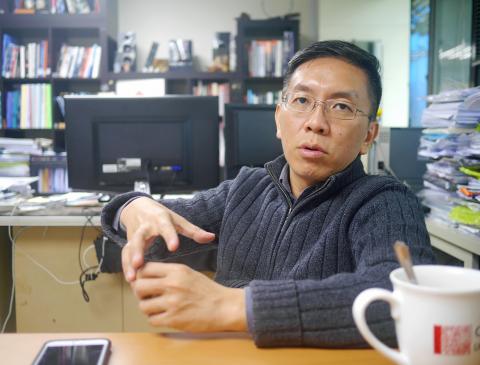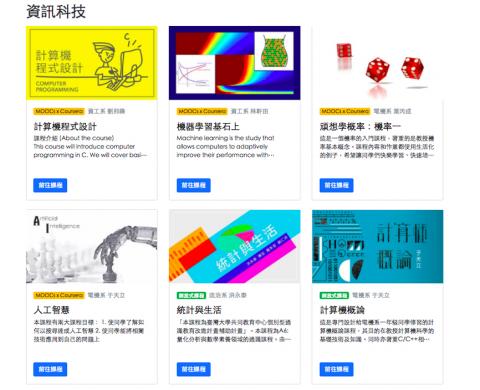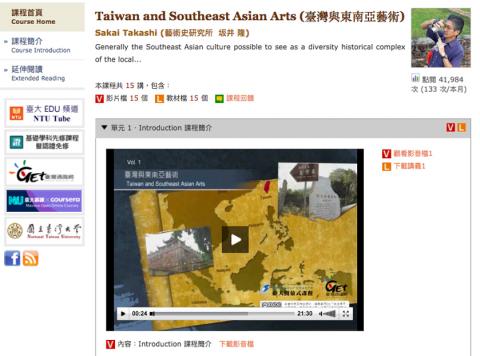Last month, National Taiwan University (NTU) opened an online course portal specifically targeting Southeast Asia offering dozens of courses, hundreds of video tutorials and thousands of lectures on topics ranging from machine learning to marketing, all free of charge.
However, Ngoi Qi Ying, an overseas Chinese student from Malaysia says that without local language subtitles (the courses are currently all in Chinese), the portal will be of limited value to those wanting to access quality Taiwanese education.
Created by NTU’s Center for Learning Development in partnership with the Taipei Economic and Cultural Office in Thailand, team leader Chien Shiuh-shen (簡旭伸) hails the project as a critical step for NTU in becoming a knowledge platform in Southeast Asia.

Photo: Liam Gibson
The portal is structured into four curriculum streams: information technology, business management, humanities in history and Asia Pacific studies. Students can enroll in Massive Online Open Courses, or MOOCs, which are a type of e-learning course made available on the Internet to large numbers of people without charge, or simply access the video tutorials and lectures.
Chien says it is the center’s core mission to make higher education resources public, for use by citizens of the global community regardless of where they live or what time they can study.
“As we are a very good university in the region, it is incumbent upon us to share this expert knowledge,” he says.

Photo: Liam Gibson
Ngoi, who has been studying life science at NTU for three years, says she thinks the project is a positive development. But what Malaysians really need is content in their national language.
“Malaysia is a multicultural country,” she says. “Malay, the national language, is the primary language spoken among Malays, Chinese and Indians alike.”
“If the courses are taught in Chinese, the other ethnic groups won’t be able to understand and won’t benefit,” she says.

Photo: Liam Gibson
Ngoi says adding subtitles to the videos in local languages would help overcome the issue.
Chien says the center is currently expanding its range of English-language courses, as English is the most commonly spoken language throughout the region. He adds that after sufficient English-language content is added, the center will start on Southeast Asian local languages.
However, there is a broader challenge facing the portal — which is spreading the word. Yong Yu Wei, a Malaysian-Chinese student studying at National Taiwan Normal University, says that while the portal sounds like a great resource, most people probably won’t know about it.
Indeed, none of the four Southeast Asian students interviewed for this report had heard of the portal.
Based on the Web site data, the portal has had nearly 1,000 visitors since launching last month on Nov. 24, around 300 from outside of Taiwan and 100 from Thailand alone.
Chien says that while these figures are encouraging, more work needs to be done to raise awareness about the resource and that the center is currently contacting both NTU student groups and organizations across the region to do this.

Google unveiled an artificial intelligence tool Wednesday that its scientists said would help unravel the mysteries of the human genome — and could one day lead to new treatments for diseases. The deep learning model AlphaGenome was hailed by outside researchers as a “breakthrough” that would let scientists study and even simulate the roots of difficult-to-treat genetic diseases. While the first complete map of the human genome in 2003 “gave us the book of life, reading it remained a challenge,” Pushmeet Kohli, vice president of research at Google DeepMind, told journalists. “We have the text,” he said, which is a sequence of

On a harsh winter afternoon last month, 2,000 protesters marched and chanted slogans such as “CCP out” and “Korea for Koreans” in Seoul’s popular Gangnam District. Participants — mostly students — wore caps printed with the Chinese characters for “exterminate communism” (滅共) and held banners reading “Heaven will destroy the Chinese Communist Party” (天滅中共). During the march, Park Jun-young, the leader of the protest organizer “Free University,” a conservative youth movement, who was on a hunger strike, collapsed after delivering a speech in sub-zero temperatures and was later hospitalized. Several protesters shaved their heads at the end of the demonstration. A

In August of 1949 American journalist Darrell Berrigan toured occupied Formosa and on Aug. 13 published “Should We Grab Formosa?” in the Saturday Evening Post. Berrigan, cataloguing the numerous horrors of corruption and looting the occupying Republic of China (ROC) was inflicting on the locals, advocated outright annexation of Taiwan by the US. He contended the islanders would welcome that. Berrigan also observed that the islanders were planning another revolt, and wrote of their “island nationalism.” The US position on Taiwan was well known there, and islanders, he said, had told him of US official statements that Taiwan had not

We have reached the point where, on any given day, it has become shocking if nothing shocking is happening in the news. This is especially true of Taiwan, which is in the crosshairs of the Chinese Communist Party (CCP), uniquely vulnerable to events happening in the US and Japan and where domestic politics has turned toxic and self-destructive. There are big forces at play far beyond our ability to control them. Feelings of helplessness are no joke and can lead to serious health issues. It should come as no surprise that a Strategic Market Research report is predicting a Compound